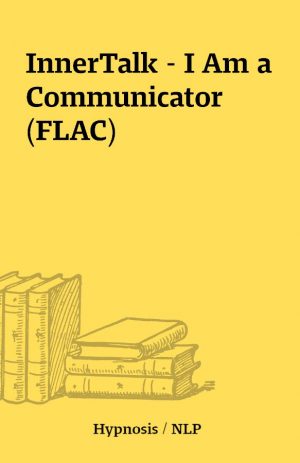Keith Livingston-Parts Therapy
Keith Livingston-Parts Therapy
[10 MP3] [1 PDF] [3 MP3]
Description
*********************************************************This material is part of the ICBCH Ericksonian Hypno GB. Sharing it outside the tracker is absolutely forbidden********************************************************* Keith Livingston – Parts Therapy :Integration for Habits, Conflicts and Decisions If you’ve done any work with smoking cessation, weight loss or any other form of habit control, you’ve probably had an experience similar to this…You reach a good level of trance, give wonderful suggestions, everything goes great as far as you can tell. The client calls you the next day and tells you they smoked as soon as they left your office.Why did they smoke? Why didn’t your suggestions work?Maybe you start to feel bad, lose your confidence, question the effectiveness of hypnosis. “Maybe I’m just not good enough,” you say to yourself.Now there are lots of hypnosis instructors out there that are still teaching based on an old, authoritarian dogma. They’ll tell you that you didn’t have a deep enough trance. They’ll tell you that you needed to repeat your suggestions more or put more emotion into them. Their entire approach is about “forcing” the client to accept your suggestions. But you’re smarter than that. You know there’s got to be a better way. The problem with simple, direct suggestion for smoking cessation, weight loss or other habits is that you’re setting your client up to battle with themselves internally.In a trance, we suggest that a client eat better or stop smoking. Well, the part of them that enjoys smoking or motivates them to eat they way they do now is listening and saying “That doesn’t sound too good to me. I think I’ll resist this suggestion.”So you’ve got part of the person behind you 100% and part of the person “resisting.” What comes next – a battle! Let me ask you this. Let’s suppose you were involved in a negotiation between two parties. Would the best approach be to label one of the parties as “bad,” and start suggesting that it be gotten rid of? Well, that’s what you’re doing if you’re using simple, direct suggestion to try to break a habit. While direct suggestion adds power to the side that wants to change the habit, there’s still a battle a brewing in the back of the client’s mind (where the real power is). Will you be successful? Maybe, maybe not. Will the client get easy, elegant change? Probably not. Truly, you’ll rarely be effective with this kind of client unless you get all the client’s motivations on the same page and working toward the same goal. What a Bank Manager Tells us about HabitsI remember having a conversation with my bank manager (I’ll call him Dan) several years ago. We were sitting at his neatly kept brown desk, in a busy bank lobby. He wanted to understand more about my hypnotherapy practice. Looking across the desk with a bit of a shaky voice (I think hypnosis scared him a little), he asked, “What is it you do exactly?”“Dan,” I asked, “If you direct your arm to move with your mind will it move?” He looked and me strangely and said “Yes, of course.” “How about your leg? Do you control that too?” I got the feeling Dan was a little sorry he’d asked me but he played along. “Sure.”“Well,” I asked, “Have you ever made up your mind to do something, maybe to start exercising or be more polite to people or eat better or stop smoking and then not followed through?”Of course, he had. Almost all of us have had the experience of deciding determinedly to start some new healthy, productive habit or stop some destructive one – and then dropping the ball. For Dan it was exercising.“Well,” I said, “if your mind controls your arms, legs and the rest of your body and you made up your mind to exercise, why didn’t you?”Poor Dan had no answer for that question. In fact, he’d never thought of it that way. How can people consciously make up their mind’s to do something and then not carry it out? Don’t we have control of ourselves? People have multiple motivations going on at the same time – some of them at cross purposes. I explained to Dan that human beings are not carved from a single block of stone. We may have more than one motivation present in us at a time. We may be conflicted.•Yes, we want to exercise but we also want to relax and take it easy.•Yes, we want to eat food that is good for us but we also may have incredible enjoyment out of eating that special something that’s soooooo good (you know what it is).•Yes we want to stop smoking but we get something out of it. I told Dan that I helped people to get those conflicting motivations all lined up so that they could live longer, better, more fulfilled lives. That’s what parts therapy is all about – getting all the motivations and resources of a client lined up and headed for the same goal.Remember a time in your life when things were going incredibly well; almost magically. Progress was effortless and you didn’t have to motivate yourself – you acted without even thinking about it. That’s the experience of being fully congruent – all your inner motivations lined up toward one goal.Now, you can get easy to follow, instructions to align the inner motivations of your clients. Discover the little known secrets of powerful parts therapy. Effectively blast away even the most stubborn habitsAbout Keith LivingstonKeith LivingstonKeith Livingston is the main instructor for Hypnosis 101. Keith has been studying hypnosis since he was a boy and doing hypnosis & NLP training since 1997.Mr. Livingston has worked for 2 nationally accredited institutions of higher learning and a state licensed vocational institution. He has participated in developing and writing several college-level courses from the ground up and teaching those same courses at a nationally accredited college.Mr. Livingston is the author of “Learn Hypnosis @ Home” and “The Phobia Self-Help Book” as well as numerous NLP and hypnosis programs for professionals and hobbyists. His “Hypnosis Tips” newsletter goes out to thousands of hypnotherapists, NLP practitioners and budding hypnosis enthusiasts each month.Mr. Livingston has spent more than a decade training people to become hypnotherapists and NLP masters; not only from the US, but from 16 other countries on 5 continents. Many have traveled halfway around the world to learn hypnosis from him. He’s taught people from many backgrounds – doctors, lawyers, mental health counselors, CEOs, teachers, computer programmers, contractors, massage therapists, consultants, ministers, martial arts instructors, and more…http://www.hypnosis101.com/parts-therapy/GB page here: : as per elib rules[b] Enjoy]
You must be logged in to post a review.






Reviews
There are no reviews yet.